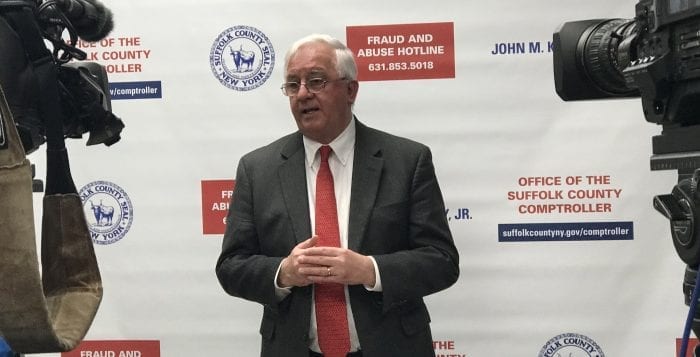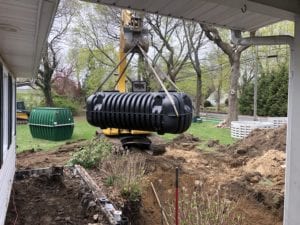Suffolk Residents Required to Pay Taxes on Septic Grants, IRS Says

After nearly a year of waiting, the U.S. Internal Revenue Service has ruled that Suffolk County homeowners should pay federal taxes on county grants that were used to upgrade septic systems.
In a Jan. 15 letter from the IRS, the agency said the grants count as taxable income, regardless of whether homeowners received payments or not.

The determination comes after Suffolk County Comptroller John Kennedy Jr. (R) requested a private letter ruling on whether the grants should be counted as gross income. Beginning last year, Kennedy’s office sent 1099 forms to program participants, despite a legal opinion by the county’s tax counsel that advised that the tax forms go to the companies that received the funds, not the homeowners.
At the time, the comptroller’s decision led to controversy and political fighting with Suffolk County Executive Steve Bellone (D). The executive’s administration has cited the prototype denitrifying septic systems as a key piece of fighting nitrogen overload in coastal waters. Kennedy and Bellone ran against each other for county executive later that year.
Kennedy said at a Feb.11 press conference that the ruling has upheld their approach to issue tax forms from the very beginning.
“They [the Bellone administration] have chosen to simply claim that I’ve made an effort to politicize this issue,” the comptroller said.
He added that while his decision may “not be popular,” Kennedy blamed the tax issue on how the septic program was set up.
“There may be ways to modify this program but it’s not up to me, it’s up to them,” he said. “We’ll continue to do the job we’re supposed to do.”
Peter Scully, deputy county executive, who heads the county’s water quality programs as the titular water czar, said Kennedy continues to simply play politics with the septic program.
“This program is too important; we are going to find a solution — this will be a temporary disruption,” he said. “The fact that the comptroller is essentially celebrating the ruling speaks volumes about his motives.”
“We’ll continue to do the job we’re supposed to do.”
— John Kennedy Jr.
Scully noted that since the comptroller’s initial decision last year, they have altered application documents to make clear to applicants that the grants they were applying for could be subject to income tax.
While some individuals have decided not to move forward with the program, homeowners are still applying for grants. In January alone 111 homeowners signed up, Scully added.
Since the program’s inception in 2017, the county has disbursed 293 grants and expended $3 million. In addition, the county received $10 million in state funding for the septic system program.
The Bellone administration has said there are about 360,000 outdated and environmentally harmful septic tanks and leaching systems installed in a majority of homes across the county. Nitrogen pollution has caused harmful algae blooms and can negatively affect harbors and marshes that make areas more susceptible to storm surges as well.
In a statement, Bellone continued to call Kennedy’s decision political.
“The comptroller’s actions have been contrary to the intent of the Suffolk County Drinking Water Protection Program, the legal opinion by the county’s tax counsel, and longstanding practices used by similar programs in Maryland and other municipal jurisdictions,” Bellone said. “He chose to politicize water quality and decimate a program that has been praised by environmental, labor, and business leaders alike … In the meantime, our water quality program is running full steam ahead.”
“This program is too important; we are going to find a solution — this will be a temporary disruption.”
— Peter Scully
The deputy executive said their main focus is protecting homeowners as they may now be exposed to new tax liability. They are also prepared to challenge the IRS ruling.
Tom O’Dwyer, a Strong’s Neck resident and engineer, has enthusiastically installed one of these systems at his own home. He said while he was aware that the grants could be potentially taxable, he and others had been “optimistic” that they wouldn’t be required to pay taxes on the grants.
“We got the 1099 in the mail the other day,” he said. “I have a lot of friends who also upgraded, nobody really expected this to happen … this is a blow to everyone.”
Despite the ruling, O’Dwyer still believes that he made the right choice in upgrading and thinks the septic program is still a good cost-effective option. He plans on talking to his tax adviser to discuss what his options are moving forward.
The Strong’s Neck resident also acknowledged that the ruling could end up hurting the momentum of the program.
“I think it could affect homeowners who want to voluntarily upgrade their system,” O’Dwyer said. “With the increased tax liability, they’ll have to pay more out of pocket and some might think it’s not worth it.”
The county executive’s office has plans to work with federal representatives to reverse the IRS decision. They have already had discussions with Sen. Chuck Schumer (D) and U.S. Rep. Tom Suozzi (D-NY3), Scully said.
Suozzi has already sent a letter to IRS Commisioner Charles Rettig, saying he strongly opposes the decision and that it undermines the program’s mission.






